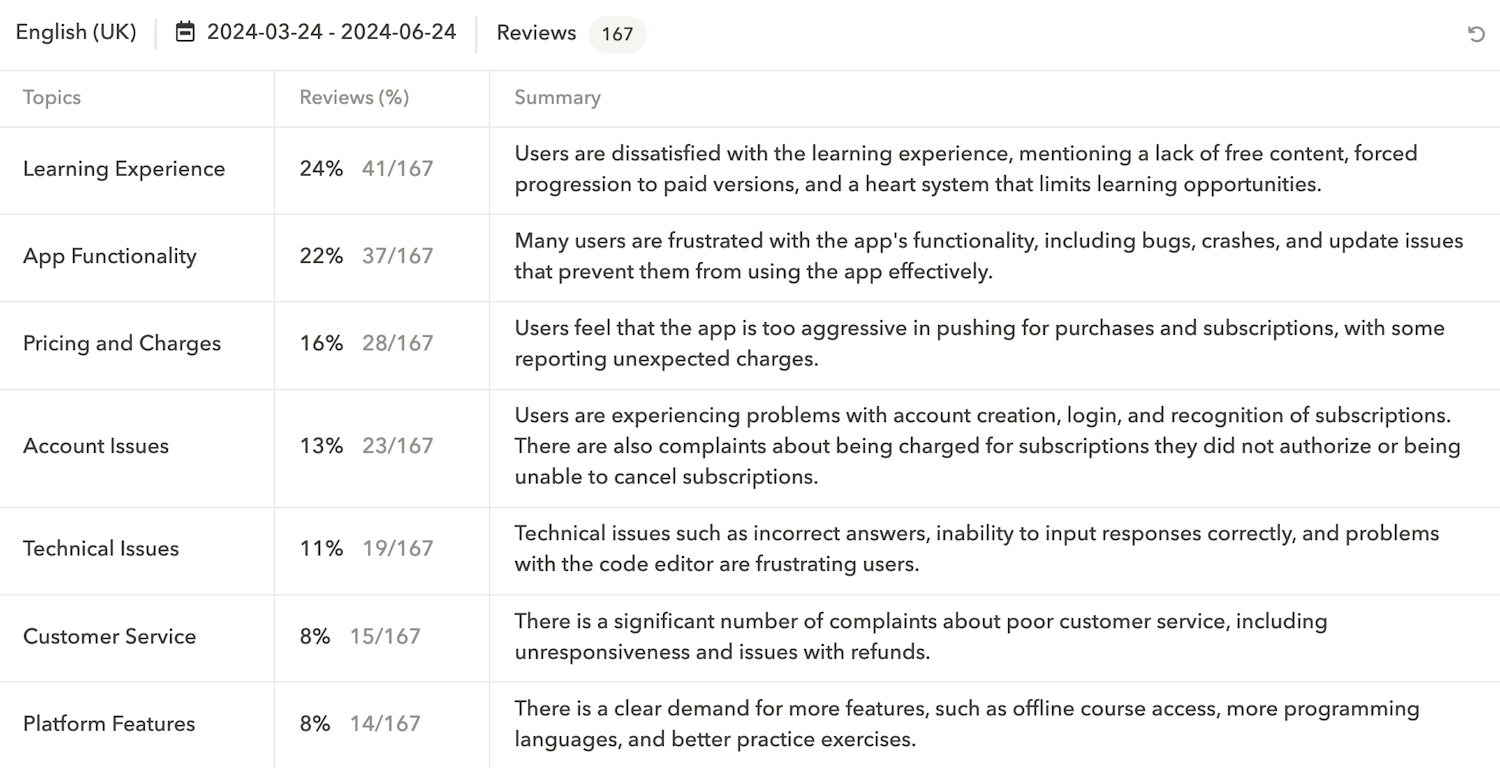
Understanding Sentiment Analysis in App Reviews
Did you know 79% of users check ratings & reviews before downloading an app? On the app stores, user opinions matter.
For app marketers, reviews are a goldmine of user feedback. They contain valuable insights into the specific features users love, major pain points, and potential opportunities.
One of the most effective ways to analyze your app reviews is through sentiment analysis, also known as mining your app store reviews. This process involves analyzing thousands of reviews at once to gain a comprehensive understanding of user sentiment, preferences, and pain points.
In this blog, we’ll delve into the importance of sentiment analysis on app reviews, and how it can completely transform your product, marketing, and customer support strategies.
Why is app review sentiment analysis important?
Reviews are a direct line of communication between app store marketers and their users.
Positive reviews can boost an app’s visibility, attract new users, and signal a great user experience to the app store algorithms. Negative reviews, on the other hand, can harm your brand’s reputation, deter potential downloads, and even limit where the app stores promote your app.
For mobile-first companies, fast-growing apps, or those in highly competitive industries, analyzing app store reviews should be a top priority to optimize your user experience. Sentiment analysis plays a crucial role in your growth, enabling you to understand user opinions at scale.
1. Improve your product based on user feedback
First, conducting sentiment analysis on app reviews will provide unique feedback on specific features and product updates.
Jumping on this feedback can help your product team build a more impactful roadmap and react more quickly to bugs. This provides a more data-driven approach to aligning your product with user expectations, helping you improve customer satisfaction and retention.
For example, Netflix receives hundreds (sometimes thousands) of new reviews every month. A few months before removing the popular series The Vampire Diaries from their platform, their app review sentiment analysis was fairly positive:

However, after Netflix removed The Vampire Diaries in September 2022, the app’s sentiment analysis revealed major frustrations with this update – the top negative keywords in reviews this month were “vampire,” “diaries,” and “vampire diaries”. Viewing the specific reviews containing these keywords then helps us better understand user sentiment in app reviews:

Monitoring how your app review sentiment changes over time will provide your team with a better understanding of user preferences. This is crucial for ensuring more successful updates, better reactivity to feedback, and higher retention in the long term.
Read this blog for tips to monitor app reviews & ratings
2. Leverage sentiment analysis for ASO: keywords & creatives
Analyzing user reviews can also greatly guide your ASO efforts. Since sentiment analysis uncovers the most repeated keywords in your reviews, it can be a valuable source for your app’s metadata:
- Positive keywords: If users often describe your app as “easy,” “innovative,” or “smooth,” these are great keywords to include in your ASO strategy. By matching keywords in your metadata to the words used by store visitors, you can make your app easier to find and attract people looking for the same experiences.
- Negative keywords: At the same time, you should avoid highlighting features associated with negative keywords. If “slow performance” is a common complaint, you could avoid emphasizing speed until the issue is fully resolved. Addressing these problems in future app updates can also help you reduce negative reviews over time.
- Screenshot inspiration: Since app review sentiment analysis highlights your most loved features, this can also be a great starting point for your screenshots! Showcasing what users love in creatives will direct potential users toward your most appealing features, putting you in the best position to drive downloads.

3. Use app reviews to find new CPP opportunities
The feedback in your app reviews will also uncover your app’s strengths and weaknesses compared to competitors. As a result, the insights you gather through an app review sentiment analysis could be perfect for identifying unique selling points that can be highlighted in your marketing efforts (e.g., CPPs).
Expert Tip
Don’t forget to analyze your competitors’ reviews for advanced insights to increase your competitive advantage.For example, conducting a sentiment analysis for Headspace reveals major themes in user opinions; users particularly love the app for meditation, sleep, and anxiety purposes:

Understanding the prevalence of different themes in user feedback will help you more effectively prioritize marketing campaigns. For instance, knowing that “meditation” and “sleep” are Headspace’s most-loved features could reinforce the team’s decision to invest in custom product pages (CPP) that promote these benefits:

AppTweak also helped SoundCloud create effective custom product pages (CPPs) by analyzing customer reviews. The team discovered that users appreciated features like unlimited skips and fewer ads, giving SoundCloud a distinct competitive edge. These insights became a powerful tool for shaping successful future campaigns, helping SoundCloud improve the performance of their ASA campaigns by 58%!
Discover more ASO success stories here
Go further with AI tools to analyze app reviews
With AppTweak’s AI-powered App Reviews Manager, you can easily gain invaluable insights into your user feedback to gauge customer satisfaction and identify areas for improvement. This data will empower you to craft more effective marketing strategies, make informed decisions, and ultimately develop an app that truly resonates with your audience.
Get a summary of all your app reviews with the Topic Analysis
While sentiment analysis identifies the most repeated keywords in your app reviews, a Topic Analysis will allow you to go further in your investigation and scale your review management strategy.
Powered by advanced AI, our Topic Analysis leverages a deeper understanding of the sentiment behind different keywords. As a result, we are able to return a more complete summary of your user feedback and its importance.
In other words, a Topic Analysis is the most efficient way to uncover actionable insights to improve your product, marketing, and customer support strategies:

Mining app reviews with AppTweak’s data scientists
With our home-grown Atlas AI at the heart of AppTweak’s platform, our data scientists were quick to leverage machine learning to analyze a vast database of app store reviews.
Experimenting with smart techniques that focus on word frequencies and their associated semantics, our team has also developed a machine-learning model that identifies the most distinct topics across thousands of app reviews and tracks their evolution over time.
Learn more about our AI model to extract insights from app store reviews
This method helped us overcome some limitations we had faced with ChatGPT, allowing us to link any topic back to a group of reviews, quantify the prevalence of different themes in feedback, and even pinpoint when a particular topic first emerged.
Review Management with GPT-4
Centralize all your app store reviews & increase efficiency with GPT-4 reply suggestions, templates, Zendesk integrations, and more.
Conclusion
In short, sentiment analysis in app reviews is an invaluable tool for app developers and marketers. By strategically leveraging app review sentiment analysis, find powerful insights to improve your product, refine your marketing strategy, and ultimately boost customer satisfaction. Remember, every piece of feedback is an opportunity to improve and grow.
Interested in performing a sentiment analysis on your app store reviews to identify what users are talking about? Request a demo now!



 Oriane Ineza
Oriane Ineza


 Natalia Kryukova
Natalia Kryukova